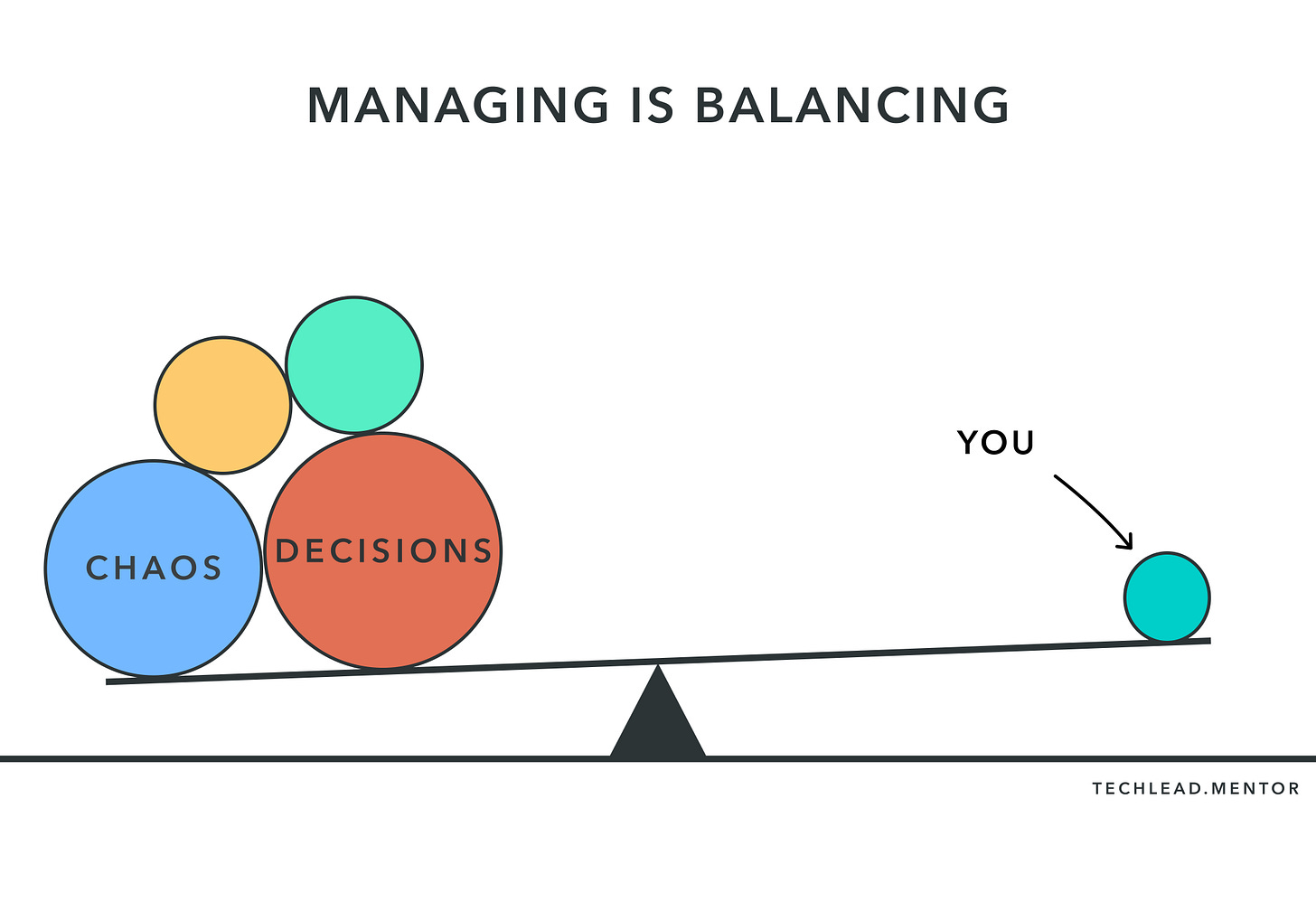Should You Become a Manager? Take this Short Quiz
5 questions you should ask yourself before becoming a manager.
Are you a high-performing engineer and being offered a managerial role? Do you want to take it? Stop! Take a moment to figure out if this is the right job for you.
Today we have a guest post by a Director of Engineering, Anton Zaides, that will help you find the answer. Over to Anton.
A lot of engineers are promoted based on their coding skills.
While I believe engineering managers must be strong developers with a few years of experience, it has almost no indication of success in a management role.
A short quiz to determine if it’s a good fit for you:
WorkOS: start selling to enterprises with a few lines of code (Sponsor)
WorkOS is a modern identity platform for B2B SaaS. It provides flexible and easy-to-use APIs to ship user management, SSO, SCIM provisioning, and fine-grained authorization in minutes instead of months.
WorkOS powers some of the world's hottest startups, including Perplexity, Vercel, and Webflow.
1. Do you like to code?
A LOT: 0 points
I’m a big open-source contributor, writing code is the best part of my job.
Yes: 1 point
I enjoy creating things and solving problems.
Coding is a means to an end: 2 points
There are some tasks I enjoy, but I don’t mind reducing the time I write code.
No: -1 point
I prefer to avoid code if I can, management sounds like a great escape path.
Why is it relevant?
⚠️ When you are promoted to an engineering management role, you’ll code less, no way around it. If you try to squeeze in coding tasks anytime you can, you will neglect important parts of your job. You should be able to let it go.
If you have a small team and enough time, it’s always good to stay technical.
🚫 Why -1: The promotion can’t be an escape from code. You will be an engineering manager - you’ll need to lead engineers, make technical decisions, and influence the technical roadmap. People will have a hard time following a manager who doesn’t care about what they do.
If you don’t care for any of that - that’s ok! Consider the PM career.
2. How do you deal with focus changes
Very badly: 0 points
Ahh I hate it! It takes me time to get into the zone, and an annoying meeting in the middle of it can ruin my day.
It’s distracting: 1 point
It sucks when people distract me all the time, but I can live with it.
It can be refreshing: 2 points
It’s nice to have a diverse day, I don’t mind doing different things.
I love chasing shiny new things: -1 point
I have severe ADHD and I enjoy every moment of it!
Why is it relevant?
⚠️ Say goodbye to the good old days, where on some days your only meeting was the daily. You’ll have to get used to smaller chunks of focused time, and to being distracted. Part of your job will be to help your people and be available for their needs.
This one is not a mandate from heaven, you can create processes to make it easier for you, like specific availability hours. The more senior the team, the more free time you’ll have. You should definitely avoid being a bottleneck.
🚫 Why -1: engineering is a discipline that requires focus - whether it is for the sake of your people (who can’t be distracted by you every 5 minutes), or for your tasks (technical designs can take even more focus than coding). If you like being active and jumping around, consider a career change (maybe operations?)
3. Do you like talking to people?
It’s a necessary evil: 0 points
COVID was a present from god to me. I prefer working alone from home 100% of the time.
Depends on the people: 1 point
I don’t enjoy meaningless small talk, but I can hold a conversation with smart people.
Mostly: 2 points
I’m not getting tired from 1:1 conversations, and I’m ok with having a lot of active meetings.
Absolutely!: -1 point
The best part of my work is the kitchen-talks! I can talk for hours, it’s so much fun!
Why is it relevant?
⚠️ A lot of engineers are introverts, and that’s fine. Introverts can be amazing managers. The question is how exhausted are you from talking with people. You’ll have many more interactions which you can’t ignore. If you prefer solo work, you might suffer in a manager’s role.
🚫 Why -1: Having a manager who just talks all day is hard. Your employees will still be engineers in heart, even if you might not be… This is not a criticism - you might be a great manager in other disciplines (like sales, product management, marketing).
4. How do you deal with chaos?
I hate it: 0 points
I like to receive my tasks in organized Jira tickets, with clearly defined steps.
I’m ok with it: 1 point
I prefer clear instructions and goals, but I can manage without them if I have to.
I enjoy creating order: 2 points
Some chaos is good. I just need to know the end goal and the reasons for it, and I’ll find a way to get there. I enjoy helping others figure out what needs to be done.
I’m the king of chaos: -1 point
I prefer to work on a day-by-day basis, who knows what the future will bring. Plans are useless.
Why is it relevant?
⚠️ You are used to most of the things being organized for you. Once you become a manager, you will start to notice all the problems in the organization. The VP R&D might bombard you with strange requests, and the PM might change his mind 5 times in a day.
🚫 Why -1: You need to be able to organize that chaos in the context of your team. You cannot be a ‘free spirit’ anymore.
Subscribe for weekly articles on leading a software development team.
Pledge your support
5. Can you be decisive and stand your ground?
No: 0 points
I always struggled with it, it’s easier for me to follow someone in authority.
If I have to: 1 point
I prefer someone else to show me the way, but I’ll not stay quiet when I think they are wrong.
Yes: 2 points
I don’t mind some conflict. Sometimes I’m a bit stubborn, but I make quick decisions and listen to feedback.
I’m like a rock: -1 point
If I know I’m right, you’ll never be able to convince me otherwise.
Why is it relevant?
⚠️ As a fresh engineering manager, you’ll be pushed around. Your manager and PM will have their own agenda. Other managers will try to sneak in tasks for your team. Being able to confront others and stand behind your decisions is critical to inspire confidence in your people.
🚫 Why -1: there will be cases when you are completely right, and you still have to give up. That’s life. If you are very hard to work with, and never willing for others to take the lead, everyone (including you) will suffer.
Understanding the score
<4 points
The engineering management path is not for you - you’ll probably end up suffering (and your team too). Depending on your answers - consider the IC path, or switch to a different discipline (PM/CS/sales/marketing)
4-7 points
It’s a tough decision for you. I suggest to give it a try. Be open with your manager, and monitor how you feel. If after a few months (or a year at most) you still suffer through every day, it’s time for a change. Read ‘Why team leaders give up’, and ‘Why managers have more bad days’ to see what you should expect :)
8-10 points
Go for it. There is never a 100% chance you’ll enjoy the job (it depends on so many variables - your manager, your team, the company itself), but I would bet $100 that you will, with time.
Last words
PLEASE don’t take this test too seriously 🙂 It’s not scientific by any means, it is solely based on my experience and the experience of those around me. The goal of it is to give you some materials for thought, in case you are considering that promotion.
It’s Raviraj again. Thank you, Anton, for sharing the nuances that engineers should consider before becoming managers.
For more articles from Anton, subscribe to the Leading Developers newsletter.
Shoutout
The Art of Influence: A Staff Engineer's Playbook by Sidwyn Koh and Chaitali Narla
How I got 27 hours in a week by installing one tool by Jordan Cutler
Why and How to Build Your Personal Brand on LinkedIn by Hemant Pandey
If you enjoyed this article, then hit the ❤️ button. It helps!
If you think someone else will benefit from this, then make sure to 🔁 share this post.







About to take this. It’s been on my mind a bit now.
I feel like the 1s are a description of me (all 1s). I think I can survive being a manager (already I am dev lead which is close enough), but long term probably it isnt for me. I would not be happy if all I do is deal with people all day long and not tech.
On the other hand, at the place I work, I feel like developers are 2nd or even 3rd rate citizens: people act like being managers and in meetings the whole day is what work is about; anything else is of lesser value.